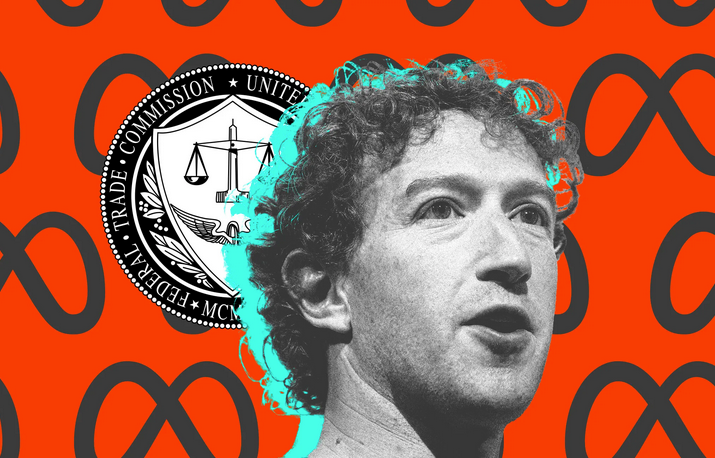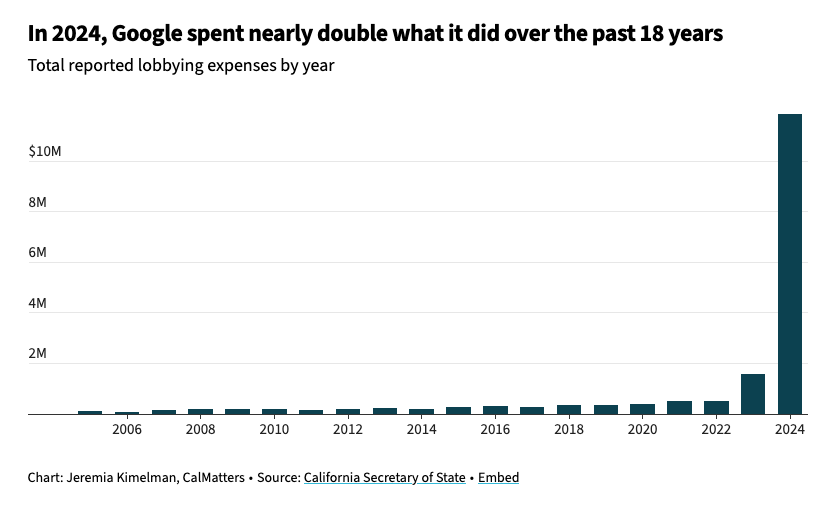Countering Google's NatSec Concern Trolls, META: Buy-OR-Bury < Buy-AND-Bury

Welcome back to The Dispatch from The Tech Oversight Project, your weekly updates on all things tech accountability. Follow us on Twitter at @Tech_Oversight and @techoversight.bsky.social on Bluesky.

📨 MEMO: DON’T BUY WHAT GOOGLE IS SELLING: TECH MONOPOLIES ARE A NATIONAL SECURITY THREAT: The Meta whistleblower hearing has brought home the dangers of letting Big Tech operate unchecked in countries that are direct adversaries and undermining U.S. national security interests. Still, Meta isn't the only monopoly undermining our economic and national interests. We wrote to lawmakers, calling on them to take a closer look at Google's ad tech business and innovation-killing monopoly, which could be setting us up for failure in the AI race.
As former FTC Chair Lina Khan put it, "When there isn't enough competition, our tech industry grows vulnerable to its Chinese rivals, threatening U.S. geopolitical power in the 21st century."
While it's not news that Google's ad tech platform lets marketers target you based on your internet activity to sell you shoes and vacations, but the manipulation goes much deeper. Google software is so sharp that it lets foreign adversaries identify high-level U.S. national security officials for phishing attacks.
An out-loud question: Why does Google create "audience segments" that target government personnel at all – let alone operate in hostile countries?
Google says, "Our core products – Google Search, Play, Workspace, YouTube, and others – are not available in China." But that's just misdirection: they sure do operate Android there, and they sure do sell ads there. Globally, they make even more money than Meta. That said, Google's Form 10-K, a required Securities and Exchange Commission filing to guard against financial impropriety, does not disclose how much Google makes in revenue from China. We think the public should know how much and if Google shares key AI technology with the CCP – just like Meta did.
We already know Google bent over backward to censor content for authoritarians in China and Russia. We know they have let YouTube be a mouthpiece for Chinese propagandists. But there's so much more that Google refuses to disclose. Congress can't afford to wait for the courts. It's long past time to legislate against Google's monopolies (in search, ad tech, and app stores) and ask Google the tough questions.
For more, read our memo here.

🪦 BUY-OR-BURY? NO, BUY-AND-BURY: This week, in Meta’s ongoing antitrust trial, Instagram co-founder Kevin Systrom testified that after Meta bought his popular photo-sharing app, it left Instagram “‘starving’ for investment.” Meta intentionally degraded the service so it wouldn’t overtake Facebook’s less feature-rich photo sharing.
Zuckerberg “believed we were hurting Facebook’s growth,” so he refused to give Instagram the staff it needed to build out its video capabilities and shut down popular features like letting Instagram users crosspost to other platforms like Twitter or Tumblr. “The users, they just kept coming,” before the acquisition, Systrom said – and Zuckerberg couldn’t tolerate the competition.
We’re not the judge, but to be honest, that kind of sounds like something a monopoly would do to buy up the friends-and-family social media market. We’re glad Meta was able to set the record straight: buy-or-bury was always a false choice in Menlo Park.

💰Google spent nearly $12 million lobbying California state legislators in 2024, more than double their spending in the prior 18 years combined. The surge in lobbying is in response to California’s more muscular approach to tech regulation. Meanwhile, Meta spent more on lobbying in D.C. in Q1 than it ever has.

We can’t let the tech giants buy off lawmakers in Congress and statehouses across the country – to protect our kids, to protect our economy, to protect our national security, we need to pass laws that truly hold Big Tech accountable.

📣 DIRECT ACTION AIMED AT META: Anger continues to mount against Meta as the company continues to jeopardize the lives of young people online, even as teens continue to die from illegal drugs purchased on platforms, rampant bullying, increased rates of depression, and suicide. Dozens of parents held a vigil outside of Meta’s NYC headquarters on Thursday, demanding action to protect kids from online dangers. Tammy Rodriguez, whose 11-year-old daughter Selena was groomed by men online, set up an account posing as a 12-year-old. She said, "Within weeks the whole algorithm changed, I would never have received that on my own, just suicide content, self-harm content," Rodriguez said.
Another mother whose son died by suicide after being victimized by sextortion said she’s been trying to meet with Zuckerberg for five years. But the company won’t meet with her, or any of these parents, because they don’t want to admit they’re sacrificing children in pursuit of profits. Meta won’t take children’s safety seriously – so lawmakers have to step up and protect our kids.

The Verge: Former DOJ antitrust chief says a Google break up will benefit the internet
In ad tech, Google owns the ad seller tools, the buyer tools, and the biggest ad exchange, giving it an unparalleled level of control. Former Assistant AG Jonathan Kanter told Nilay Patel on the Decoder podcast that a Google breakup would help new ad and content businesses get funded and enter the market, revitalizing publishing revenues and bringing competition back to the digital ad business.

💻 OPENAI OPEN LETTER: Several Nobel laureates, legal scholars, former OpenAI employees, and tech advocacy groups – including the Tech Oversight Project – signed on to an open letter to California and Delaware AGs demanding they stop the $300 billion AI giant from abandoning its nonprofit status. The letter argues that OpenAI cannot legally become a for-profit company because it has legally committed itself to serving the public.
From TOP’s Sacha Haworth: “OpenAI’s nonprofit structure was intentionally designed to ensure the company’s work always benefited humanity – a goal that is now at risk. We’re counting on California’s and Delaware’s attorneys general to hold OpenAI to its original mission to serve the public.” Putting corporate profits ahead of that mission doesn’t just run contrary to every story OpenAI has ever told about itself: it violates the law. And we won’t back down until OpenAI is held accountable to the commitment it made to advance the public good.

“OpenAI’s nonprofit has no right to cede its control over OpenAI. Its obligation is to humanity. Humanity deserves a say in how AGI goes. Therefore, it shouldn’t sell that control at any price. It shouldn’t sell that control even if it makes fundraising much more convenient.”
– Kelsey Piper on Vox’s “Future Perfect”

